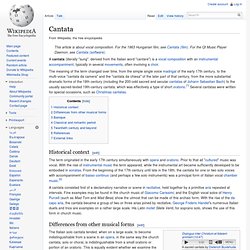

J.S. Bach - Choral from Cantata No.147. J.S. Bach - Cantata No.66〈Erfreut euch, ihr Herzen〉BWV 66 / Philippe Herreweghe. Bach - Cantata 140: Wachet auf, ruft uns die Stimme, BWV 140 (1731) The Cantata - Cantatas. Cantata comes from the Italian word cantare, which means "to sing.

" In its early form, cantatas referred to a music piece that is meant to be sung. However, as with any musical form, the cantata has evolved through the years. Loosely defined today, a cantata is a vocal work with multiple movements and instrumental accompaniment; it can be based on either a secular or sacred subject. Early cantatas were in the Italian language and were written in sacred (church cantata) or secular (chamber cantata) styles. 17th century composers for the cantata include Pietro Antonio Cesti, Giacomo Carissimi, Giovanni Legrenzi, Luigi Rossi, Alessandro Stradella, Mario Savioni and Alessandro Scarlatti; the most prominent composer of cantatas during that period. Before long, the cantata was making its way to Germany courtesy of Johann Hasse; one of Scarlatti's students. Cantata. Historical context[edit] The term originated in the early 17th century simultaneously with opera and oratorio.

Prior to that all "cultured" music was vocal. With the rise of instrumental music the term appeared, while the instrumental art became sufficiently developed to be embodied in sonatas.